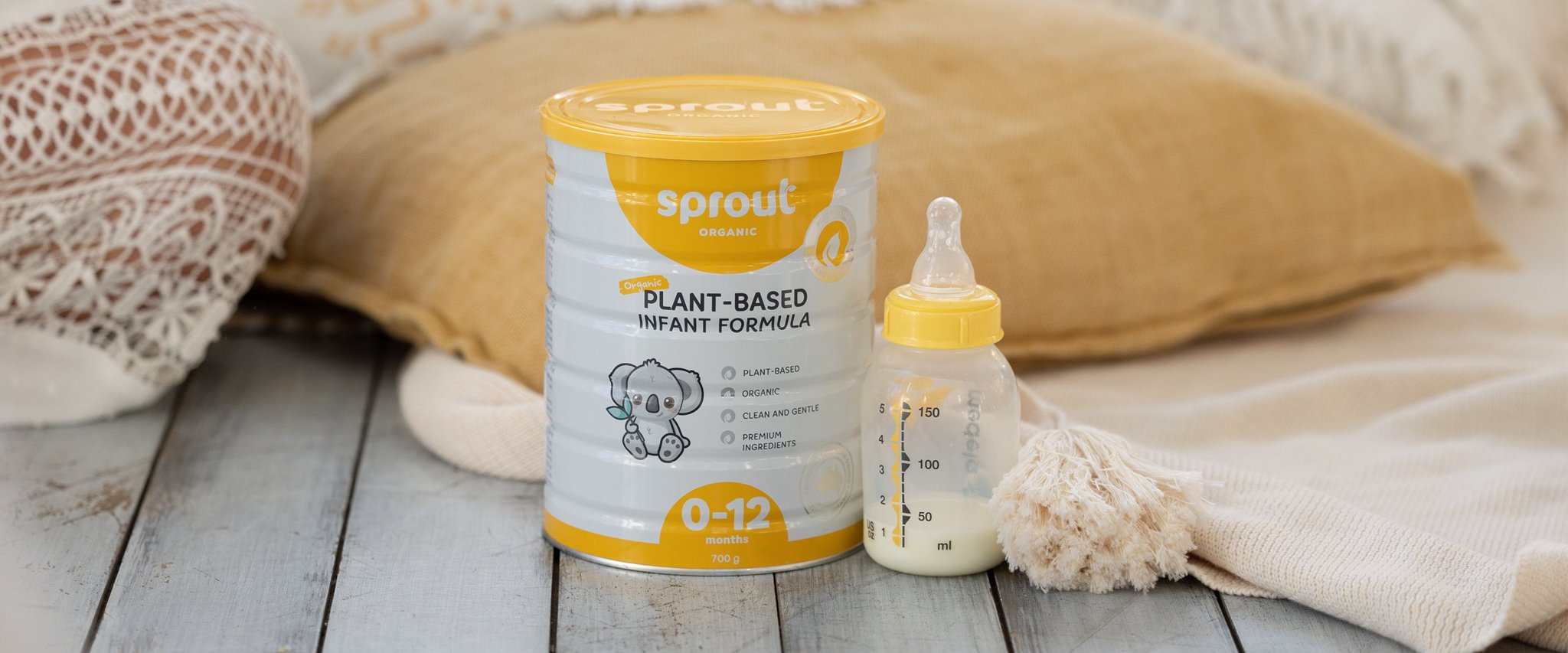A Guide to Plant-Based Nutrition for Infants (6–12 Months)
Part 2 of 5: Nourishing Plant-Based Babies
As your baby grows, so do their nutritional needs. Between 6 and 12 months, your little one is developing rapidly — cognitively, physically, and socially. This stage marks the introduction of solid foods, and for plant-based families, it's the perfect time to build strong, nourishing habits.
In this part of our five-part series, we’ll explore everything you need to know about feeding your baby a balanced, plant-based diet during this critical window.

Plant-Based Nutrition: The Essentials
When feeding your baby, the goal isn’t perfection — it’s balance and variety. Here are the foundational principles:
-
Focus on variety, not perfection
-
Your baby’s growth is the most important indicator of nutritional health
-
Check in regularly with a paediatrician and dietitian to track progress
-
Create a positive feeding environment — how your baby eats is just as important as what they eat
Protein: Building Blocks for Growth
Why it matters: Protein is essential for your baby’s growth, immune function, and tissue repair.
Daily goal: ~14g for babies aged 7–12 months
Best sources:
-
Lentils, chickpeas, beans
-
Tofu (soft or silken for safety)
-
Quinoa
-
Nut butters (introduced after checking for allergies)
Tip: Combine different plant proteins throughout the day to ensure a full amino acid profile.
Fats: Brain Food
Why it matters: Fats provide 40–55% of your baby's daily energy and support brain development and cell growth.
Daily goal: ~30g for 7–12 months
Best sources:
-
Avocado
-
Ground flax or chia seeds
-
Olive oil
-
Nut butters
Tip: Add olive oil to purees or pasta for extra calories and better absorption of fat-soluble vitamins.
Carbohydrates: Energy for Growing Bodies
Why it matters: Carbs are your baby’s main energy source, supporting the demands of rapid development.
Daily goal: ~95g for 7–12 months
Best sources:
-
Cooked oats, quinoa, and brown rice
-
Starchy vegetables like sweet potato and pumpkin
-
Fruits like banana and cooked apple
Watch out: Avoid added sugars and excessive fibre, which can fill small tummies without meeting energy needs.
Iron: A Critical Mineral
Why it matters: Iron supports brain development and oxygen transport. Babies’ iron needs spike after 6 months.
Daily goal: ~11mg for 7–12 months
Best sources:
-
Iron-fortified baby cereal
-
Mashed legumes
-
Dark leafy greens
-
Tofu
Tip: Pair iron-rich foods with vitamin C (like kiwi, berries, or red capsicum) to enhance absorption.

Supplementation: What You Need to Know
Vitamin B12: Non-Negotiable
Why it matters: B12 is vital for neurological development and only found in animal products, so supplementation is a must for plant-based babies.
-
Daily dose: 5mcg
-
When to start: Once solids become a major nutrition source (~9–12 months)
-
Important: B12 deficiency can cause irreversible damage — don’t skip this one!
Vitamin D & Omega-3: Brain Builders
Vitamin D:
-
Daily dose: 400 IU
-
Supports calcium absorption and bone growth
-
Use vegan D3 (lichen-derived) or D2
-
Start from birth if breastfeeding, and continue alongside solids
Omega-3 (DHA/EPA):
-
Daily dose: 100mg DHA
-
Critical for brain, cognitive, and eye development
-
Choose algae-based supplements
-
Begin once solids become primary nutrition (~9–12 months)
Allergen Introduction & Plant-Based Babies
Should plant-based babies be exposed to animal allergens?
Early exposure (by 12 months) may reduce the risk of allergies — but always speak to your healthcare provider first.
Common allergens to introduce:
-
Plant-based: peanuts, tree nuts, soy, sesame, wheat
-
Animal-based: egg, dairy, fish (optional — discuss with your healthcare team)
Tips for safe introduction:
-
Introduce one allergen at a time in tiny amounts
-
Monitor closely for reactions
-
If tolerated, serve 2–3 times a week to maintain exposure
Your Daily Nutrition Checklist
Here’s a simple way to stay on track each day:
✔ Iron-rich food at every meal
✔ Vitamin C-rich food at every meal
✔ Healthy fat source daily
✔ Quality carbohydrate source daily
✔ Responsive feeding (follow your baby’s hunger and fullness cues)
✔ Supplements: B12, Vitamin D, DHA (as needed)
Sample Menu (9–12 Months)
Morning: Breast milk or formula + iron-fortified cereal with mashed berries and ground chia seeds
Mid-Morning Snack: Soft tofu cooked in olive oil with avocado slices
Lunch: Mashed chickpeas, quinoa, and chopped spinach
Afternoon Snack: Smoothie with fortified plant milk, banana, and nut butter
Dinner: Lentil and vegetable Bolognese with soft pasta

When to Seek Help
Check in with your healthcare provider if your baby shows signs of:
-
Slowed growth or development
-
Pale skin, brittle nails or hair
-
Fatigue or frequent illness
-
Ongoing digestive issues or food refusal
Remember: Every baby is unique. Trust your instincts and get support when needed.
Ready to Learn More?
Stay tuned for next week’s post, where we’ll cover fuelling your toddler’s growth with plants.
It’s always best to consult a doctor or dietitian for personalised guidance.






Leave a comment